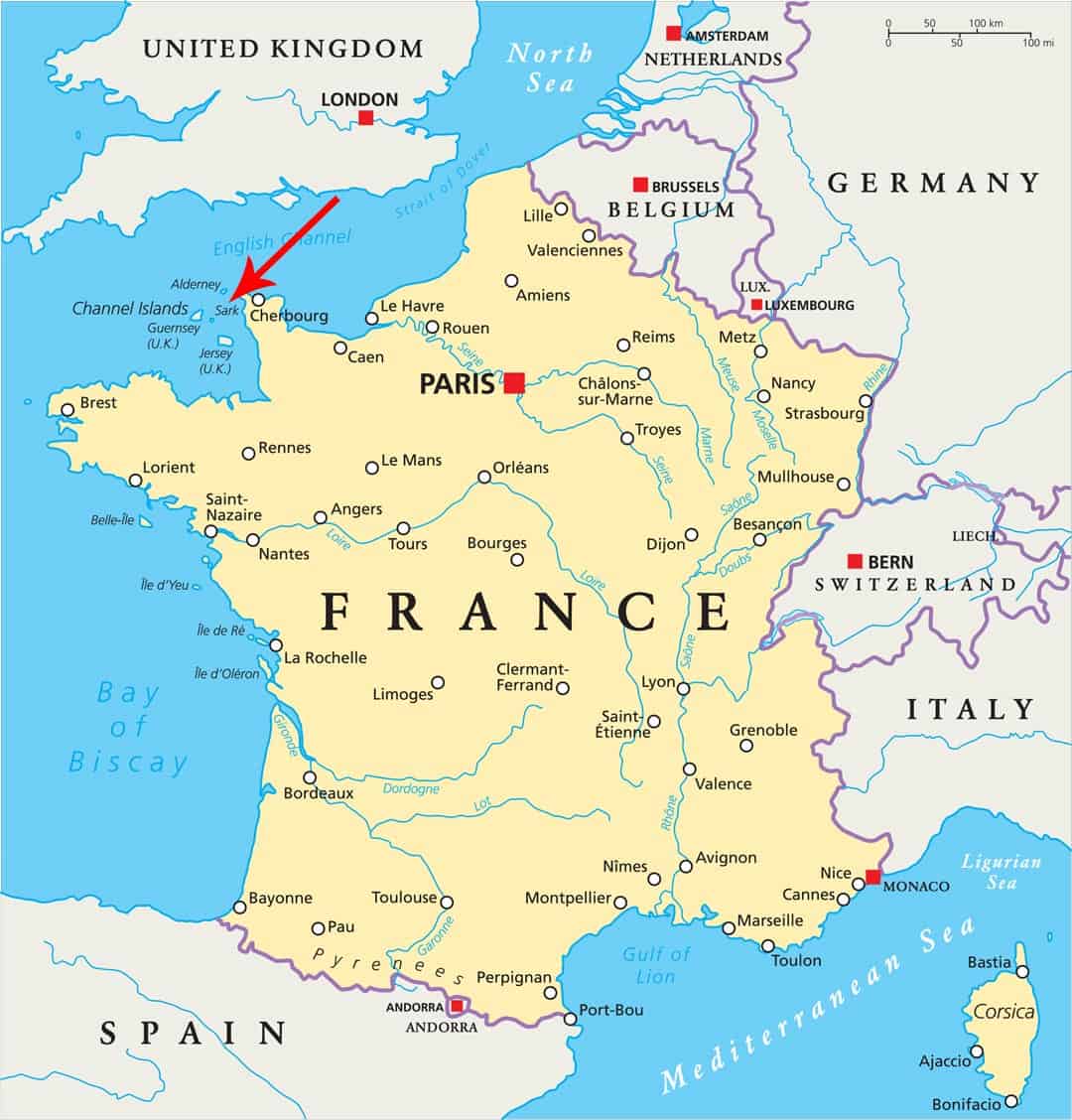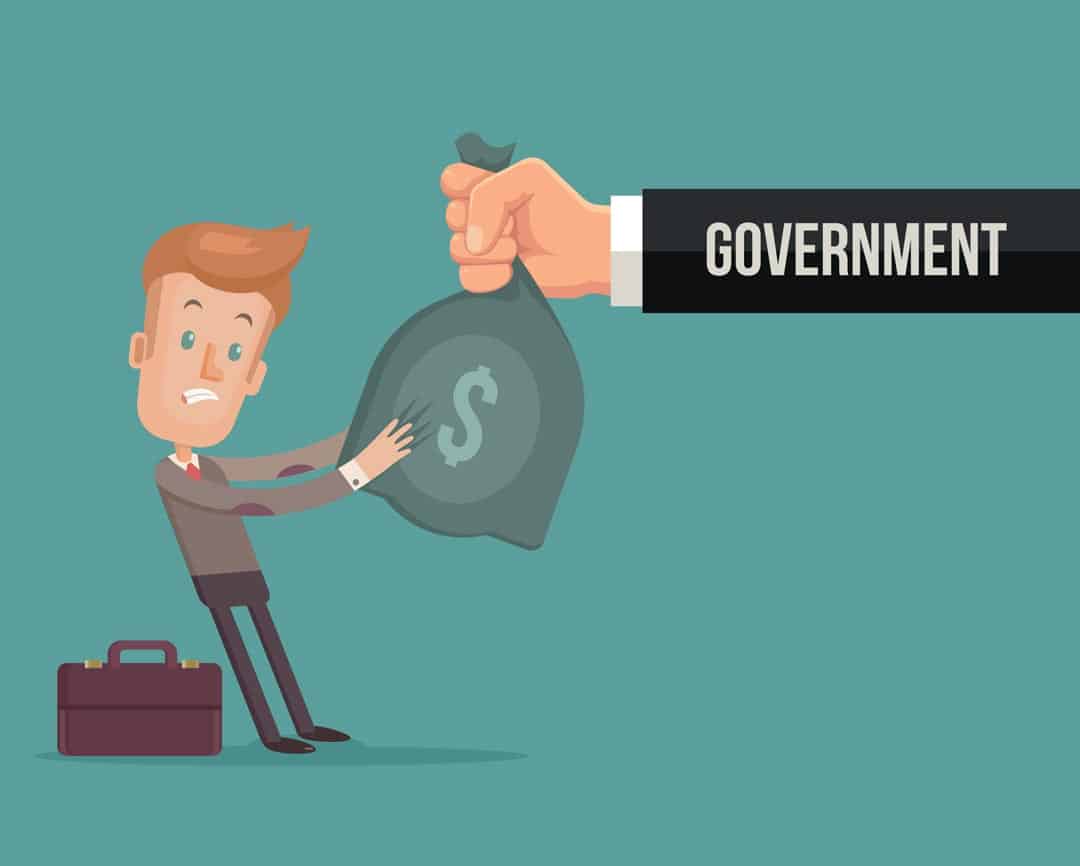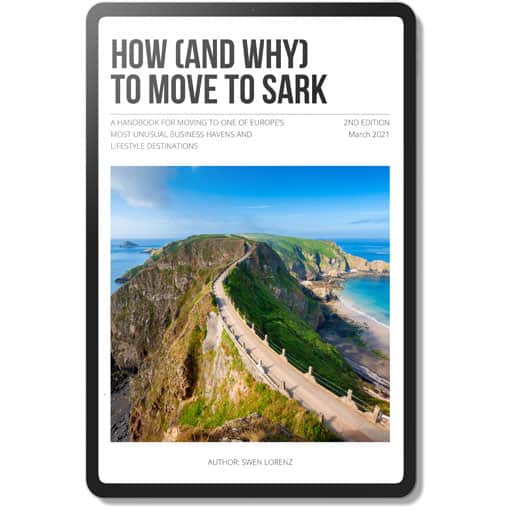My friends used to associate me primarily with big cities, the likes of London, New York, or Hong Kong. Nowadays, I live on Sark in Britain’s self-governing Channel Islands, an island of just 5.5 square kilometres (2.1 square miles) in size. It has 400 residents in summer and as few as 80 during the depth of its relatively mild winter; though the summer population is propped up by 50,000 tourists and day-trippers who come to enjoy the stunning scenery and unspoiled coast.
What drove me to change my life in such a way, and why are some of my friends now considering to do the same?
Since I regularly get asked about the small island that has become my primary home, I decided to sum it all up in an article. This article will be useful for anyone who is looking to change (i.e., improve) the way they live and work; who are eager to build wealth faster than they could elsewhere, and who are looking for an attractive base from which to pursue a lifestyle that includes frequent traveling.
The points I am listing below can very roughly be divided into three categories:
- Aspects that primarily relate to living in Sark (3 of 10).
- Aspects that relate to living in a jurisdiction that is comparable to Sark, of which there are several dozen around the world (3 of 10).
- Aspects that generally hold true when you move between countries (4 of 10).
If you are dreaming of a life that is good for your business, good for your bank account, and good for your lifestyle, then the following might contain some useful insights and inspirations for you.
1. Fewer distractions to allow for bouts of deep work
It’s no secret, I enjoy an active social life and the temptations of big cities. When I am in a place like London, I tend to go out and do something every day. It could be a museum in the afternoon or a dinner party in the evening. On days when I cannot find a playfellow, I happily go out exploring by myself.
Because I get up early and usually work quite intensely until midday, being exposed to such distractions isn’t too much of a problem. However, there is no denying that if you want to pull off extraordinary feats, you require a place that allows you to single-mindedly focus on the task at hand.
E.g., once a month, I write a 50 to 100-page report for my investment blog. It does help to be in a place where I can spend three, five, or ten days without distractions.
Everyone finds or creates their own routine, and for myself, I have turned my time on Sark into the periods when I focus intensively on researching and writing long pieces. This could also consist of writing business plans for ventures I am involved with or reading a small stack of new books to keep up to date with what’s new in the world.
The key is, if you are on a small island with a limited social life and limited public infrastructure, then you aren’t constantly pulled into different directions.
Since I enjoy my work, I do look forward to my monthly stay in Sark. Each time I go back home, I know exactly what I am going to use the upcoming period of time for. When taking a break from these tasks, I have my books, my DVDs, my cast-iron bathtub and my garden to tend to, as well as a limited but high-quality social life (see point #7).
When I am finished, I return to the hustle and bustle of the world’s large cities; usually starting with London because flight connections from the Channel Islands are such that the metropolis on the Thames is my natural hub for connecting to elsewhere in the world.
My life’s current setup makes these focussed periods an automatism.
I vary the length of these stays, depending on my workload, preferences, and travel plans. This year, during the particularly quiet January period, I enjoyed spending three weeks on Sark with virtually no one else around (and only one pub that was open during that part of the season). This compares with the upcoming month of August period when I’ll hardly be on the island at all because I’ll be touring Peru and the Galapagos Islands with a group of friends that I do business with. Sark legally defines “residence” as “having a place available to you” either as freehold owner, leasehold owner, or tenant, which is why you are relatively free to decide how much time you spend there (provided you don’t then spend 360 days a year in Copenhagen – in which case the Danish tax authorities would want to have a word with you).
Come to think of it, one of the most popular articles on the website of the Financial Times in recent weeks was “The anti-social secret of success”. Janan Ganesh, the FT journalist, wrote “it is almost impossible to excel in any field without prolonged periods of exclusion.” Much as this point, which I placed at the top of the list on purpose, might not appeal to everyone, it does contain an important truth. If it’s possible to achieve greatness without periodically isolating yourself from distractions, then I haven’t found the right way to achieve that yet.
My life’s current setup makes these focussed periods an automatism. I created this setup with a place that I genuinely like, and which comes with a couple of other factors and benefits that I appreciate. Such as…

When you get to read from me, it usually originates from this tiny island that is virtually on the same latitude as Paris (and gets the most hours of sunlight of any spot in the British Isles)
2. Cutting out the biggest time thief of your life
Speaking of taxes, there is also the issue of taxes on Sark. To be more precise, it is a relative lack of taxes when compared to most other jurisdictions in Europe.
As a self-governing Crown Dependency that is independent even from the other Channel Islands (Guernsey or Jersey), Sark’s parliament determines its own tax rules. This has been the case since 1565, and it is based on an arrangement that was agreed for perpetuity. In case you didn’t realise, the Channel Islands are not part of the UK, neither are they a member of the EU. They are self-governing and even issue their own passports; though the Queen, in her ancient role as Duke of Normandy, has to give her Royal ascent to new laws.
Taxes should never be the sole – or even primary – reason for choosing a place to live. E.g., I’d rather slit my wrists than to live in Monaco. However, giving some careful thought to where you live and how this affects your taxes could be one of the single most important financial decision of your life, besides buying a home and choosing your education. This question has a massive influence on building the kind of life you desire to live.
Once a year, the OECD analyses what percentage of GDP is collected as taxes in its member states. This is a broader figure than the income tax charged to an individual, but it’s revealing how high it is nowadays. On average, in the 34 of the 36 OECD countries that provided data, 34.2% of GDP is collected by governments as taxes. This is the highest it has been since records began in 1965. In the UK, the figure was 33.3%. In France, it came out at 46% – the “top performer” of the group. Germany came out at 37.5%, and you can check your own country by using this link to the OECD website. However, even these numbers are understated. Many factors amount to de facto taxation, but which most people don’t recognise as such, for example:
- I have long argued that any money that anyone spends on tax advisors is, ultimately, nothing but another tax. Creating overly complicated taxation rules and requiring citizens to hire and pay advisors that can decipher the legislative maze for them is the equivalent of another tax. Having to pay a tax advisor is less money in your pocket, and their existence is solely due to excessive government regulation. How would this not be a form of tax? Tax advisors should also be counted as de facto government employees, and their work certainly doesn’t contribute to a nation’s wealth.
- If you spend time on filling out your own tax returns, then the value of that time is also a tax. After all, you could have used that time earning money.
- Most governments massively cook their books and rake up massive debt. Shouldn’t debt that is incurred in one year not also be added to that year’s total amount of taxes to make for a more accurate and honest picture?
On Sark, paying my yearly dues is as simple as it gets:
- The tax return that I need to fill out is one page (the back page is only there for my signature and some ancillary information).
- It takes me less than two minutes to fill out my annual tax return. There is no room for misinterpretations or complications. There are nine categories, of which only two will apply to any one person. It’s so simple that a five-year-old could fill it out. Nota bene, no one has to disclose their income or their wealth if they don’t want to, because the tax is primarily based on the size of the property you inhabit as tenant, leaseholder or freeholder.
- No one has to pay more than GBP 7,000 (USD 8,900) in taxes per year, and most Sark residents pay less than half that. A single person living in a good standard one-bedroom flat could expect to pay about GBP 2,000 (USD 2,500) per year; besides a monthly rent of about GBP 1,000 (USD 1,250).
Besides that, Sark residents pay taxes when boozing, but that barely affects me. There are also taxes on keeping a dog or having a bicycle, but they are negligible.
There is probably no other factor that is as detrimental to your building wealth than the taxation where you currently live.
Countries like the UK or Germany celebrate “Tax Freedom Day” every year. That’s the first day of the year on which theoretically you have earned enough to pay your taxes for the year. From that day onwards, you work for yourself instead of the government.
In the UK, that day usually falls into the month of June.
In Germany, it’s July.
The US is comparatively lucky, with Tax Freedom Day falling into April.
Depending on how your business does, in Sark, it’s more likely to be before the end of January!
This is possible because Sark takes an old-fashioned approach. The government of Sark provides a basic level of civilisation, such as operating a court, employing a sheriff, and providing some help to those who have fallen on genuinely hard times. However, it does not send cheques to distant shores to provide “foreign aid”, it has armed citizens instead of a standing military (owners of freehold properties are legally obliged to have two loaded guns in the house), and there is no vast apparatus of bureaucrats to feed because most government functions are handled by citizen volunteers.
This means that you are free to keep most of what you earn.
There is probably no other factor that is as detrimental to your building wealth than the taxation where you currently live.
Move to a place like Sark, and you reduce the problem to the level where it ceases to be a problem.
With dozens of similar jurisdictions to choose from around the world and the ever-growing possibilities of using technology to work remotely for at least some of the time, what’s your excuse not to make such a move?

Don’t be a victim!
3. No time wasted on silly government rules
You might wonder if this is a repetition of the previous point, but I do feel there is an important point that deserves separate mentioning.
In a country like France, one in five adults of working age are public servants (and some statistics put it as high as one in four). This doesn’t even include those who aren’t technically employed by the government but should be counted as such, e.g., tax advisors (see point #2) or anyone employed by a private company to deal with government regulation.
The public service sector includes all sorts of professions, including irreplaceable, valuable ones like nurses or teachers. But too many of them are nowadays kept busy through the operation of an excessive administrative state. These busybodies need to justify their existence somehow, which is one of the reasons why ever-new rules and regulations are created. The same holds true across Europe and too many other countries around the world.
Come to think, the EU has even created rules for the length of candle wicks. The insanity of creating ever more regulations to create employment for sprawling state bureaucracies has only known one direction during the past half-century – it keeps getting worse!
For an entrepreneur or freelancer, there are few other areas where over-regulation and the artificial creation of work for bureaucrats are more visible than in employment laws.
I tried to find out the word count or page count of the labour laws that are in place in the UK. Lo and behold, I was not able to find such a number. These laws and their various strands of related regulation are so lengthy and complicated that no one can tell you how long they actually are.
I was once on the receiving end of these regulations. An employee of a UK-registered company that I was a director of sued the company for racial discrimination (and other claims). Nota bene, he was a white bloke. The frivolous case sucked in vast amounts of management time that would have better been invested in the actual business. In the end, we had to settle and bear costs of around GBP 50,000, because fighting these frivolous charges simply wasn’t worth it. This could have bankrupted a business.
Compare that to the word count of employment law on Sark: Zero.
Yes, that’s right. Sark has no employment law. The island’s labour market functions without the interference of government-employed busybodies. Grown-ups are free to sign any form of employment contract they like. For claims such as not getting paid, there are the usual laws to pursue payment through the courts. Besides that, the government simply stays out of the matter of employment.
Take a guess how much time I have spent worrying about employment laws when having someone do work for me.
That’s more time I can invest in my business, and less of my resources getting redirected for other purposes.
This is a mere example. The point is, some jurisdictions have a sensible approach to regulations, and others don’t. There are over 200 countries and territories around the world, and you should choose one that allows you to focus on your business rather than on satisfying the excessive needs of bureaucrats.
4. Increase in self-confidence because you are the master of your life
As you will have taken from the previous points, living in a place like Sark requires you to take a higher degree of responsibility for your own life.
This is quite different from the philosophy that has been spreading in large parts of the Western world over the past decades. Relying on yourself, not expecting others to bail you out unless circumstances genuinely beyond your control have made you fall on hardship, and being able to reap the full rewards of what you create is how the Western world became successful, but it’s not how it is anymore. E.g., I recently came across the figure that in Germany, only 12m of the 82m population are privately employed or business-owning net contributors to the government. The other 70m are either net takers of government benefits or employed by the government. That’s 15% of the population keeping the other 85% of the population afloat. How sustainable will this prove in the long-run?
Living on Sark means you have to take care of your own affairs.
For healthcare, you need to find a private insurer and educate yourself about different levels of care that are available, which insurers are willing to cover you in other countries should you decide to move again later in life, and generally be able to spot the best deal amidst a plethora of providers. (As an aside, I am going to publish an eBook about this subject later this year.)
The same holds true for providing for your old age, and other aspects of life. You are obliged to look out for your own interest, and free to make any arrangement that you see fit.
I have no doubt that anyone who adopts this attitude and mindset will generally do well in other areas of life, too.
Once you have done that, it feels incredibly empowering. You feel like you are entirely in control of matters because you will have researched the best options and chosen what you deem is in your own best interest.
I have no doubt that anyone who adopts this attitude and mindset will generally do well in other areas of life, too.
Taking charge of your own destiny and “doing it” is what leads to success.
Again, I have merely used my personal situation on Sark as an example. The general point is clear, and you can choose from many different jurisdictions to find a place that suits your preferences.
5. Improved health
As I write this, I have the window of my bedroom open, and the breeze from the nearby sea is blowing fresh air in.
Regularly spending some time in a place that is green and unpolluted is good for you. Compare that to London, where one-quarter of the population lives in areas with air pollution that is above the legal limit (which implies the other 75% of the city can’t possibly be doing too well either).
Throw in the fact that Sark has no cars, which is why I have to walk everywhere. The island is small, but it has a lot of topography. Mini workouts are an automatic part of life, and produce you buy locally is fresh and organic.
It’s not my primary motivation for moving, but what’s not to like about enjoying this for some part of the month? It’s an excellent counterweight to the time I spend walking across fume-infested cities and airports when traveling around the world during other parts of the month.

Looking for clever ways to invest your hard-earned cash?
Head over to my investment website Undervalued-Shares.com for common sense investment opportunities from around the world. Ideas that you won’t find anywhere else!
6. Acquiring new skills
Depending on the definition, I have lived in seven countries by now.
Looking back, I can say that each time I had to settle or spend substantial periods in a new country, I learned at least one, and usually several new skills.
You’ll probably laugh, but in Sark, that has turned out to be gardening. I did have a gardener for a while but eventually decided I’d like to do a bit of gardening work myself. A friend from the finance industry on neighbouring Guernsey had come to Sark to participate in a permaculture course, which got me interested in the subject.
I wouldn’t be surprised if one day I ended up moving to the Southern parts of Chile or Argentina to live on a large piece of land. To make sure pursuing such an option is easier as and when the time has come, I am now getting my hands dirty to gradually build up some knowledge in growing stuff.
Besides that, I am seriously considering using my period in Sark to get a gun license. Which, as far as I have been able to research it so far, is much easier than in the UK or most other Western European countries.
This is quite different from learning English (when I first lived in the US), developing a deeper understanding of a country’s deeply rooted finance culture (when I lived in Switzerland), or picking up a basic understanding of Spanish (when I lived in Ecuador).
But for the purpose of what I have in mind for the rest of my life, these are the skills I am currently enjoying to pick up. Most of it eventually comes in useful, and in the meantime, it keeps me young and active to continually learn something new (see #2 on my list of 44 things I know because I am now 44).
7. Adding yet another “local network” to my “network of networks”
On the one hand, there are all sorts of ways to end up having friends, acquaintances, and professional contacts around the world. On the other hand, many of my best connections and friendships have come out of spending an extended time in one place and building up a local network.
Because of my history of living in different countries, I now have a whole range of places that I can visit (or which I could move back to) and fall right into an existing network of people.
I have such local networks in London, New York, the Galapagos Islands, mainland Ecuador, Zurich, several cities in Germany, Guernsey, and to a lesser extent Hong Kong and Tokyo.
Other people move on, too. However, once you have made a fair number of friends in any one place, there are usually a good number of people who stick around.
These local networks give me great joy and are very useful for business. But they do require actually spending a lot of time in a place for a while because you can’t build them up through short visits.
Because of my history of living in different countries, I now have a whole range of places that I can visit (or which I could move back to) and fall right into an existing network of people.
No doubt, the Channel Islands, one of the world’s greatest financial hubs, will also forever remain on my list of local networks available to me. My current plan is to spend a good number of years here, before eventually moving on to somewhere else. Different places can be great for a phase of your life, before you move on to find something suitable for the next phase.
8. You get to change (and experiment with) your identity
This sounds more James Bond than it is. It’s true, however, that with each international move, your identity changes a bit.
It’s all the more the case if you move to a place that has a strong identity of its own. Your chosen home’s identity then inevitably rubs off on you, for better or worse.
Nowhere else was this more strongly the case than during the nearly four years when I lived and worked in the Galapagos Islands. These islands have a potent identity that is known around the world, and working there leaves strong marks on who you are and how you are perceived by others.
Dealing with this, and using it to your advantage, is also a skill that has to be learned. I am the first to admit that it wasn’t until fairly recently that I realised just to what an extent this is the case; that it takes a bit of thought and experience to determine how you want to use it, and that you can actually have a bit of fun with it!
Have a think about whether something like this would appeal to you, and then draw up a list of your dream places that you’d like to experiment with in this regard.
Around the turn of last year, an observant friend from London told me: “You are now the dude from the small island, that’s your story.”
This was the moment when it really hit me. I whole-heartedly agreed, even though I had never quite seen it like that before.
Since then, I have been actively “playing the Sark card” – as you can see from this article!
Have a think about whether something like this would appeal to you, and then draw up a list of your dream places that you’d like to experiment with in this regard.
I much recommend it as an experience, and as something you can play to your advantage.
9. Throw a serious challenge your way, because that’s the only way to grow
As you can see from the previous point, even after my relatively extensive experience of moving around internationally, I am still learning.
It probably all sounds like it’s fun and easy when I write about it. The truth is, though, that I too still have to regularly make an effort to push myself outside my comfort zone.
Moving internationally is alien to probably >90% of the population (less than 10% of most country’s people ever live outside the boundaries of their home country). It IS quite a challenge. Make no mistake about that.
But it’s only when you push yourself outside your comfort zone that you truly grow.
Moving across borders and starting anew somewhere else is difficult, but it helps you to make leaps forward as a person. Just plan it properly, check how you can best learn from others who have done it already, and then do it!
10. An international mindset is the ultimate Plan B
When you have done something once, you stop being afraid of it. My first international move was an effort and a challenge for me, but now I’d view having to start over somewhere else as something I’d simply get done without thinking much about it.
I am not obsessed with doom-and-gloom predictions, but I do see manifold dangers in this world. Having lived through the 2008/09 financial crisis, I feel that I have gotten a first-hand experience of just how fast and suddenly the world can change in the worst possible ways and without many people expecting it.
But I have set up my life in such a way, that I have the mindset, the know-how, and the overall flexibility to pack up and move elsewhere if that’s what the situation required.
My family had to leave Germany in the 18thcentury and start all over again in the German settlements that sprung up around Eastern Europe. In 1945, they got kicked out of Czechoslovakia and yet again had to start from scratch. My generation has enjoyed a period of relative stability and peace. However, regularly losing everything and having to start over has been the norm throughout history rather than the exception.
Such scenarios are probably likelier than we admit to ourselves. Not only did the Western world have a close brush with just that in 2008/09. The problems that led to this situation weren’t resolved in Western Europe but postponed. It’s not unreasonable to worry that a bigger, more powerful repeat of these events will eventually come our way one day. Then what?
I am reasonably on top of the (in some aspects, quite welcoming) Japanese immigration system; I follow a real estate agent for properties in remote parts of Chile, and I spent 2018 visiting a dozen countries with a specific aim of checking them out for potentially one day living there. In other words, I always keep an eye on what my options are.
For now, I am firmly rooted in Sark and intend to stay here. But I have set up my life in such a way, that I have the mindset, the know-how, and the overall flexibility to pack up and move elsewhere if that’s what the situation required.
This is a mindset you almost automatically take up once you have become comfortable with moving internationally. It could turn out to be an even more useful skill if ever a major crisis of some sort requires me to look to far-away shores.

Just because everyone else marches in lockstep, doesn’t mean you can’t do your own thing
Is this for you?
I left Germany in 1998, and since then have forever been receiving questions about moving internationally.
- How difficult is it?
- What are the advantages and disadvantages?
- At what time in your life should you best do it?
- Etc, etc, etc
Honestly, it’s a subject that I suspect is going to follow me around for the rest of my life.
That’s why I figured it’d be worth spelling it all out in an article. All the more, since I notice the same questions keep coming up; most people are oblivious of a few critical factors (such as the destructive influence of excessive, administrative-state taxes on your financial future), and it gives people confidence when they hear answers from someone who has already done it several times over.
To finish with an obvious note, if you are considering to move to Sark and become my neighbour (we are a tiny community over here), do drop me a note and let’s meet for a coffee when you are here.
If you liked this article, you might also enjoy the following:
Want to print this article? Open a printer friendly version.
Did you find this article useful and enjoyable? If you want to read my next articles right when they come out, please sign up to my email list.
Share this post:


